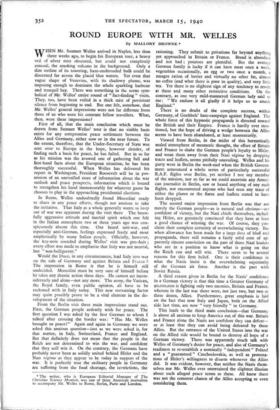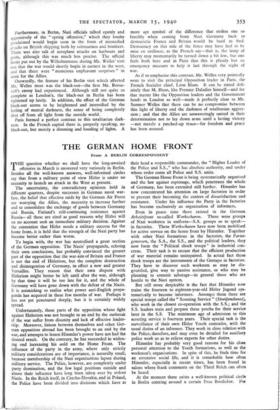ROUND EUROPE WITH MR. WELLES
By MALLORY BROWNE *
WHEN Mr. Sumner Welles arrived in Naples, less than three weeks ago, to begin his European tour, a heavy veil of silver mist obscured, but could not completely conceal, the smoking volcano in the background. Only a dim outline of its towering, haze-enshrouded bulk could be discerned far across the placid blue waters. Yet even that vague shape of Vesuvius,. with its shadowy plume, was imposing enough to dominate the whole sparkling harbour and tranquil bay. There was something in the scene sym- bolical of Mr. Welles' entire round of " fact-finding " visits. They, too, have been veiled in a thick mist of persistent silence from beginning to end. But one felt, somehow, that Mr. Welles' general impressions were not far different from those of us who were his constant fellow travellers. What, then, were these impressions?
First of all, that the main conclusion which must be drawn from Sumner Welles' tour is that no visible basis exists for any compromise peace settlement between the Allies and Germany, either now or in the near future. To the extent, therefore, that the Under-Secretary of State was sent over to Europe in the hope, however slender, of finding such a basis for peace, he has failed. But in so far as his mission was the avowed one of gathering full and first-hand facts about the European situation, he has been thoroughly successful. When Welles has delivered his report in Washington, President Roosevelt will be in pos- session of an unrivalled store of information about the war outlook and peace prospects, information which is bound to strengthen his hand immeasurably for whatever game he chooses to play in the approaching presidential elections.
In Rome, Welles undoubtedly found Mussolini ready to share in any peace efforts, though not anxious to take the initiative. That Italy as a whole generally wants to keep out of war was apparent during the visit there The boast- fully aggressive attitude and martial spirit .which one felt in the Italian atmosphere two or three years ago was con- spicuously absent this time. One heard anti-war, and especially anti-German, feelings expressed freely and most emphatically by many Italian people. Officially, however, the key-note sounded during Welles' visit was pro-Axis ; every effort was made to emphasise that Italy was not neutral, but " non-belligerent."
Would the Duce, in any circumstances, lead Italy into war on the side of Germany and against Britain and France ? The impression in Rome is that he is himself still undecided. Mussolini must be very sure of himself before he takes any drastic action these days. He cannot act incon- siderately and alone—not any more. The army, the Vatican, the Royal family, even public opinion, all have to be reckoned with in Italy today. This new restraining factor may quite possibly prove to be a vital element in the de- velopment of the situation.
From the Berlin visit three main impressions stand out. First, the German people ardently wish for peace. The first question I was asked by the first German to whom I talked after crossing the border was: " Has Mr. Welles brought us peace?" Again and again in Germany we were asked this anxious question—just as we were asked it, for that matter, in Italy, Switzerland, France and England. But that definitely does not mean that the people in the Reich are not determined to win the war, and confident that they will win it. On the contrary, the Germans have probably never been as solidly united behind Hitler and the Nazi regime as they appear to be today in support of the war. It is perfectly true the ordinary people in Germany are suffering from the food shortage, the restrictions, the * The writer, who is European Editorial Manager of The Christian Science Monitor, was one of three American journalists to accompany Mr. Welles to Rome, Berlin, Paris and London. rationing. They submit to privations far beyond anything yet approached in Britain or France. Bread is abundant and not bad ; potatoes are plentiful. But the average German family is lucky if it can have meat once a week, vegetables occasionally, an egg or two once a month, a meagre ration of butter and virtually no other fat, almost no coffee (and what there is poor in quality), and very little tea. Yet there is no slightest sign of any tendency to revolt at these and many other restrictive conditions. On the contrary, as one very mild-mannered German lady said to me: " We endure it all gladly if it helps us to smash England."
There is no doubt of the complete success, within Germany, of Goebbels' hate-campaign against England. The whole force of this hypnotic propaganda is directed toward the British and their Empire. France is hardly ever men- tioned, but the hope of driving a wedge between the Allies seems to have been abandoned, at least momentarily.
Viewed from Berlin, in the midst of this hermetically sealed atmosphere of mesmeric thought, the effort of Britain and France to shake the German people's loyalty to Hitler. and wean them away from their Nazi regime by dropping tracts and leaflets, seems pitifully unavailing. Welles and his party were in Berlin the week-end when the British Govern- ment announced a whole series of particularly successful R.A.F. flights over Berlin, yet neither I nor any member of the mission, nor so far as we could ascertain any Ameri- can journalist in Berlin, saw or heard anything of any such flights, nor encountered anyone who had seen any trace of either the planes or the flares and leaflets stated to have been dropped.
The second major impression from Berlin was that not merely the German people—as is natural and obvious—are confident of victory, but the Nazi chiefs themselves, includ- ing Hitler, are genuinely convinced that they have at least a good chance of winning the war. Of course, they pro- claim their complete certainty of overwhelming victory. But when allowance has been made for a large dose of bluff and propaganda, there still remains a fairly solid core of ap- parently sincere conviction on the part of those Nazi leaders who are in a position to know what is going on that the Reich can and will win. There seem to be several reasons for this firm belief. One is their confidence in what the Nazis insist is the overwhelming superiority of the German air force. Another is the pact with Soviet Russia.
A third reason given in Berlin for the Nazis' confidence in a German victory is that this time a Greater Germany of 90,000,000 is fighting only two enemies, Britain and France, whereas in the last war there were, not just two, but two or three dozen, Allies. Furthermore, great emphasis is laid on the fact that now Italy and Japan, both on the Allied side last time, are now " very friendly " to Germany This leads to the third main conclusion—that Germany is above all anxious to keep America out of this war. Britain and France alone the Nazis are confident they can defeat— or at least that they can avoid being defeated by these Allies. But the entrance of the United States into the war on the Allied side would be bound to destroy all hope of a German victory. There was apparently much talk with Welles of Germany's desire for peace, and also of Germany's readiness to re-establish a nominally " independent" Poland and a " guaranteed " Czechoslovakia, as well as protesta- tions of Hitler's willingness to disarm whenever the Allies did. It was evident, however, that neither the Nazis them- selves nor Mr. Welles ever entertained the slightest illusion about such alleged peace terms as these. All knew there was not the remotest chance of the Allies accepting or even considering them. Furthermore, in Berlin, Nazi officials talked openly and aggressively of the ' spring offensive," which they loudly Proclaimed would begin soon in the form of intensified attacks on British shipping both by submarines and bombers. There was also talk of aeroplane attacks on harbours and ports, although this was much less precise. The official thesis put out by the Wilhelmstrasse during Mr. Welles' visit was that the war would shortly begin in earnest in the west, and that there were " numerous unpleasant surprises " in store for the Allies.
Outwardly, the feature of his Berlin visit which affected Mr. Welles most was the black-out—the first Mr. Roose- velt's envoy had experienced. Although still not quite so complete as London's, the black-out in Berlin has been tightened up lately. In addition, the effect of the German black-out seems to be heightened and intensified by the feeling of mental darkness, the sense of being completely shut off from all light from the outside world.
Paris formed a perfect contrast to this totalitarian dark- ness. In the French capital there is, properly speaking, no black-out, but merely a dimming and hooding of lights. A more apt symbol of the difference that strikes one so forcibly when coming from Nazi Germany back to democratic France and Britain would be hard to find. Democracy on this side of the fence may have had to be mise en veilleuse, as the French say—that is, the lamp of liberty may momentarily be turned down a bit low, but one feels both here and in Paris that this is plainly but an emergency measure to help it last through the night of war.
As if to emphasise this contrast, Mr. Welles very pointedly went to visit the principal Opposition leader in Paris, the French Socialist chief, Leon Blum. It can be stated defi- nitely that M. Blum, like Premier Daladier himself—and for that matter like the Opposition leaders and the Government heads in London as well—made it perfectly clear to Mr. Sumner Welles that there can be no compromise between this light of liberty and the darkness of totalitarian aggres- sion ; and that the Allies are unwaveringly united in their determination not to lay down arms until a lasting victory —not merely a patched-up truce—for freedom and peace has been assured.























































 Previous page
Previous page